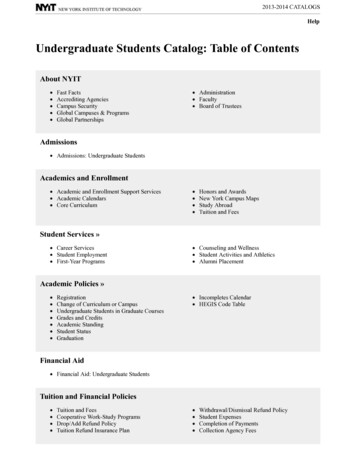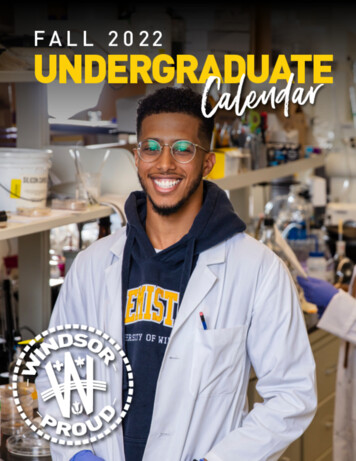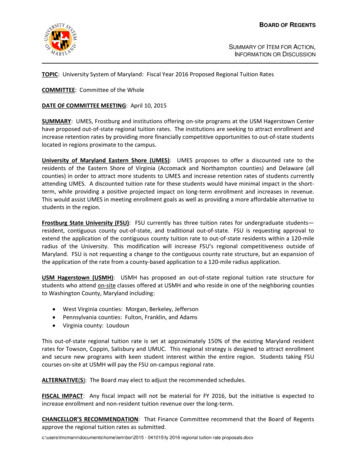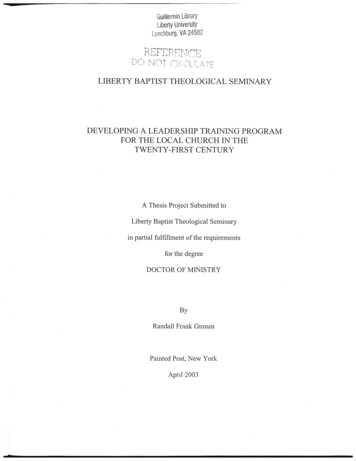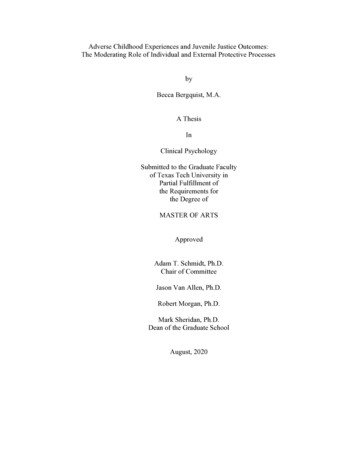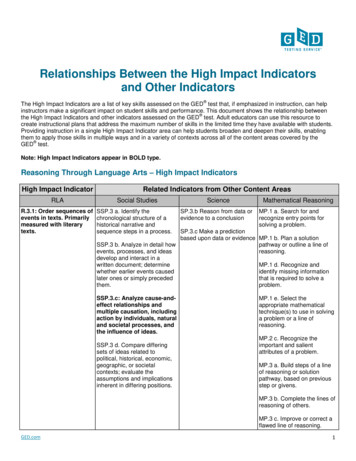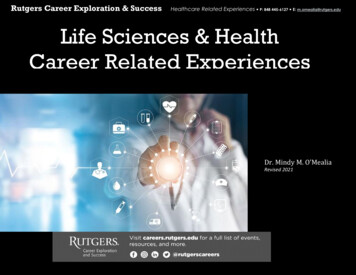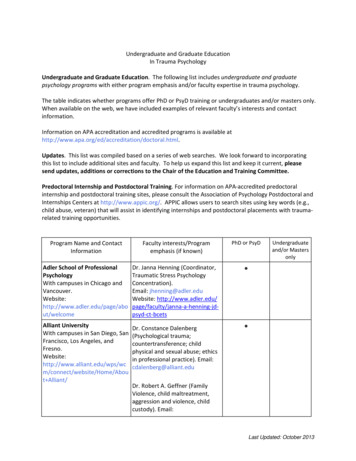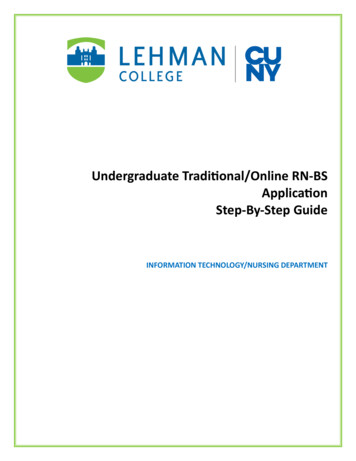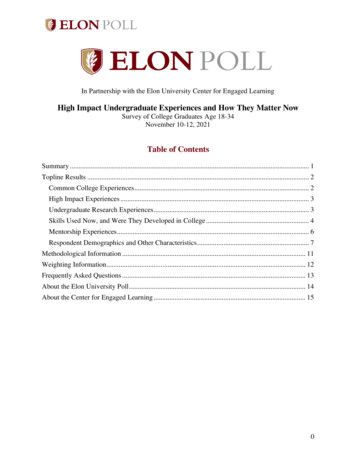
Transcription
In Partnership with the Elon University Center for Engaged LearningHigh Impact Undergraduate Experiences and How They Matter NowSurvey of College Graduates Age 18-34November 10-12, 2021Table of ContentsSummary . 1Topline Results . 2Common College Experiences . 2High Impact Experiences . 3Undergraduate Research Experiences. 3Skills Used Now, and Were They Developed in College . 4Mentorship Experiences. 6Respondent Demographics and Other Characteristics . 7Methodological Information . 11Weighting Information. 12Frequently Asked Questions . 13About the Elon University Poll . 14About the Center for Engaged Learning . 150
SummaryIn partnership with the Elon University Center for Engaged Learning, the Elon University Pollconducted an online survey of U.S. residents who were 18-34 years old and graduates of two- orfour-year higher education institutions. This goal of this survey population is to representexperiences of younger, recent college graduates in the United States. The online survey wasconducted November 10-12, 2021. Additional methodological information is in later pages ofthis report. For additional information about this research, please visit the Center for EngagedLearning’s website: https://www.centerforengagedlearning.org/ . A related 2019 survey isavailable from the Elon Poll Archive: https://www.elon.edu/u/elon-poll/archive/ .The sample of 1,832 has a credibility interval of /- 2.4 %. Total survey error can exceed thiscredibility interval.1
Topline ResultsNote: In this section of the report, table entries are row percentages, with the number ofrespondents in parentheses. Due to differential response rates to individual questions, the numberof respondents listed in each row do not always sum equally. Due to rounding, the percentages ineach row do not always sum perfectly to 100%.Common College ExperiencesDuring your college/university experience, to what extent did you encounter the following?NeverOnceMultipleTimesFaculty who asked you to draw on priorexperiences when you learned new things14.8%(272)23.7%(434)61.4%(1125)Meaningful relationships with faculty orstaff16.4%(301)29.1%(535)54.5%(1002)Meaningful relationships with k from peers to guide your workbefore you submitted a final version12.5%(228)22.2%(417)64.7%(1183)Feedback from faculty/staff to guide yourwork before you submitted a final version11.2%(205)23.7%(435)65.1%(1193)Feedback from faculty/staff on a submitted,final project7.6%(140)20.9%(383)71.4%(1309)Practice with real-world applications ofwhat you were es to reflect on how the different 17.4%parts of your college experience fit together (319)25%(458)57.6%(1054)Opportunities to reflect on how what youwere learning would apply to your future22.4%(411)67%(1230)10.6%(195)2
High Impact ExperiencesDid you take part in any of the following during college? Select all that apply.YesNoInternship or work placement50.3%(926)49.7%(913)Service-learning / community-engagedlearning course35.70%(657)64.30%(1182)Independent undergraduate researchproject32.10%(590)67.90%(1249)Capstone project or experience31.90%(587)68.10%(1252)Study abroad 338)81.60%(1501)Undergraduate Research ExperiencesNote: These questions were asked only of respondents who reported having undergraduateresearch experience above (n 590).YesNoWas your undergraduate research a required projectfor one of your courses?79.90%(464)17.00%(99)Was your undergraduate research conducted outside ofa normal class, but under the supervision of faculty orstaff?79.90%(464)20.10%(117)Was your undergraduate research an originalcontribution to your field of study?82.70%(482)17.30%(101)3
Skills Used Now, and Were They Developed in CollegeBelow you’ll find a list of skills thought to be important for success after college.For each one, please indicate whether it issomething important to your day-to-day life.Which of these skills did youdevelop, at least somewhat, while incollege?VeryimportantSomewhatimportantDeveloped incollegeDid not developin collegeResearching and understandingthe answers to complex ortant5.90%(109)81.60%(1491)18.40%(337)Writing (1463)20.10%(368)Speaking (1284)29.70%(542)Using and/or interpreting 2.10%(404)Applying your existing skills to anew )25.70%(470)Keeping up with the .80%(984)Engaging with your .80%(801)56.20%(1028)Volunteering in your (910)50.30%(921)4
For each one, please indicate whether it issomething important to your day-to-day life.Which of these skills did youdevelop, at least somewhat, while incollege?VeryimportantSomewhatimportantDeveloped incollegeDid not developin collegeConnecting with people fromdifferent cultural mportant7.10%(130)70.80%(1295)29.20%(535)Making ethical )36.20%(661)Working with a team toaccomplish 25.50%(467)Giving feedback to 30.10%(549)Making decisions on behalf of ateam or (1223)33.10%(605)Persisting in the face of 1.00%(567)Managing %(454)Meeting 23.40%(429)5
Mentorship ExperiencesHow important were the educational relationships you developed with peers, faculty, and staff to your overallsuccess in college?Extremely importantVery importantModerately importantSlightly importantNot at all 2.80%Many students have a variety of relationships with different people in college. Thinking back on your time incollege, which of these groups was most important for your overall success in college?Fellow studentsFacultyStaffAlumniOther community 44.2.40%200.10.90%Did [selected mentor] contribute to your intellectual and academic engagement in college?YesNo1661.90.60%173.9.40%Did [selected mentor] provide emotional support that helped you in college?YesNo1544.84.30%286.15.70%Did [selected mentor] help you figure out how to get things done in college?YesNo1558.85.20%271.14.80%Did [selected mentor] motivate you to study and work hard in college?YesNo1588.86.60%245.13.40%6
Satisfaction with College ExperiencesHow strongly do you agree or disagree with the following statement: My college experience prepared me wellfor the work I have done since graduating.Strongly disagreeSomewhat disagreeNeither agree nor disagreeSomewhat agreeStrongly .80%Overall, how would you rate your college experience?Very rewardingSomewhat rewardingSlightly rewardingNot at all sidering both the costs and benefits of your college experience, would you say attending college was “worthit” for you personally?Definitely yesProbably yesProbably notDefinitely t Demographics and Other .00%7
Household incomeLess than 20,000 20,000 - 49,999 50,000 - 99,999 100,000 - 149,999More than EmploymentEmployed Full TimeEmployed Part TimeUnemployed looking for workUnemployed not looking for 1.24.00%Highest education 57.00%368.20.00%Did at least one of your parents or legal guardians complete college before you?YesNo1212.66.00%625.34.00%Did you participate in intercollegiate athletics as a student-athlete?[note: this was likely interpreted to mean more than NCAA athletics by respondents]YesNo543.29.6%1293.70.4%Did you participate in an academic cohort program (e.g., Honors program, fellows program) for at least oneacademic year during college?YesNo846.46.30%982.53.70%8
Did you participate in a social cohort program (e.g., Greek Life) for at least one academic year during college?YesNo553.30.30%1272.69.70%Did you work while you were pursuing your degree?Yes- Only on campusYes- Only off campusYes - Both on and off out how much did you take out in student loans to finance your undergraduate education?NoneLess than 10,000 10,000 to 19,999 20,000 to 40,000More than 14.50%Did you receive a scholarship or non-debt financial aid as an undergraduate?YesNo1255.68.50%577.31.50%Did you live on campus for at least a year while in college?YesNo1082.59.20%747.40.80%College CharacteristicsWhat types of degrees were offered at your undergraduate institution when you attended (check all that %709.38.80%416.22.80%447.24.40%In terms of numbers of undergraduates, was your college small, medium or large?Small ( 4,000 students)Medium (4,000-15,000 students)Large ( 15,000 students)390.21.3848.46.3594.32.49
Did you take most of your undergraduate classes online or in-person?Online338.18.40%In-person1494.81.60%Did most students at your college live on campus (or in student housing near campus) or did most commute tocampus?Most lived on or near campus1195.65.40%Most commuted to campus63310
Methodological InformationMode:Population:Dates in the field:Sample size:Weighting variables:Credibility interval:OnlineU.S. college graduates, ages 18-34November 10-12th, 20211,832Age, Gender, Race, Census region, Highest degree earned /- 2.4 pointsProcedureFor this survey, the Elon University Poll used an online opt-in sample provided by Lucid, LLC.Respondents were recruited for this sample from many sample providers in the Lucidmarketplace. Respondents received small amounts of compensation in exchange for theiropinions. More information about the Lucid marketplace and quality tests are available here.Our sample was designed to represent 18 to 34-year-olds in the United States with at least a twoyear degree. This population consists of approximately 24 million individuals. We defined oureligible population as those classified by the U.S. Census as having an Associate’s, Bachelor’s,or Graduate or Professional graduate degree. The survey software, Qualtrics, screenedrespondents out of the sample if they self-reported having less than this level of education.This survey used both quotas prior to data collection and weights after data collection to matchsample demographics to population demographics of age, race, sex, highest degree and Censusregion. A raking algorithm in Stata generated weights.Credibility IntervalUnlike a traditional random digit-dial telephone survey, online opt-in surveys do not havetraditional margin of errors because they do not adhere to assumptions of random selection. Toaccount for uncertainty inherent in any sample-based research design, we provide credibilityintervals. More information about this technique can be found here. The credibility interval wascalculated by inflating traditional confidence intervals by design effects means. In this survey,the interval was calculated as follows: (1.015* 2.29) 2.32 (rounded up to 2.4)Support for TransparencyThe Elon University Poll supports transparency in survey research and is a charter member of theAmerican Association for Public Opinion Research Transparency Initiative, which is a programpromoting openness and transparency about survey research methods and operations amongsurvey research professionals and the industry. All information about the Elon University Pollthat we release to the public conforms to reporting conventions recommended by the AmericanAssociation for Public Opinion Research and the National Council on Public Polls.11
Weighting InformationThe table below presents population parameters, unweighted sample parameters and weightedsample parameters (rounded):Unweighted ceCensus RegionHighest Degree ite (non-hispanic)67%70%67%Black (non-hispanic)11%11%11%Other 2-year23%22%23%4-year57%58%57%Graduate20%20%20%We were unable to locate exact parameters for our population of interest, recent collegegraduates, age 18-34. To create the above parameters, we made assumptions based on severalsources of federal data. Data on race and highest degree earned are limited to those between 20and 34 in the labor force, not all residents 18 to 34. Furthermore, our sample does not reflectthose 18-34-year-old degree holders who lack internet access. Despite these limitations, webelieve our sample is as reflective of the population as possible.For age, sex, and highest degree earned, and region, we relied on American Community Survey(U.S. Census) 2017 Table B15001 “Sex by Age by Educational Attainment for The Population18 Years and Over.” For race, we used Table EEO-ALL07R-N1 “Educational Attainment (6) byYounger Age Groups, Sex, and Race/Ethnicity (Part I) for Residence Geography, TotalPopulation, Number Universe: Civilian labor force 20 years and over “(2010) from U.S. CensusBureau Fact Finder. We obtained percentages for each demographic group by dividingsubcategory population counts by category overall population counts12
Frequently Asked Questions1. Who pays for the Elon University Poll?Elon University fully funds the Elon University Poll. The poll operates under the auspices ofthe College of Arts and Sciences at Elon University, led by Dean Gabie Smith. The ElonUniversity administration, led by Dr. Connie Ledoux Book, president of the university, fullysupports the Elon University Poll as part of its service to the community. Because of thisgenerous support, the Elon University Poll does not engage in any contract work. Thispermits the Elon University Poll to operate as a neutral, non-biased, non-partisan resource.2. What did respondents know about the survey before agreeing to take the survey?During survey recruitment, respondents saw a title that the survey was about highereducation. In the introductory screen, respondents read, “We are hoping to understand whataspects of the college experience matter most for life outcomes.”3. Did you randomize response options?Yes. The order of college experiences and writing habits were randomized.4. Did you weight the data?Yes. We applied weights to the data according to U.S. Census information about thisdemographic group. For more details, see the Weighting Information above.5. What are the advantages and disadvantages of online opt-in surveys over traditionalrandom digit dial surveys?Traditional telephone surveys have a clear advantage over online surveys such as this in thatassumptions of equal probability of selection are more appropriate. Furthermore, onlinesurveys do not capture opinions of respondents who lack internet access.However, our opinion is that declining telephone response rates and the growth in onlinesample pool sizes have narrowed quality differences between the two modes. Additionalinformation about opt-in surveys in general is available from AAPOR and the Pew ResearchCenter.13
About the Elon University PollThe Elon University Poll conducts statewide, regional, and national surveys on issues ofimportance to North Carolinians as well as other southern states. Information from these polls isshared with media, citizens and public officials to facilitate informed public policy makingthrough the better understanding of citizens’ opinions and attitudes. By conducting several publicopinion surveys annually, the Elon University Poll is easily recognized as the “poll of record inNorth Carolina.”Jason Husser is Director of the Elon University Poll and AssociateProfessor of Political Science & Policy Studies at Elon University. Dr.Husser holds a Ph.D. in Political Science from Vanderbilt University.He researches American political behavior and survey methodology.Kaye Usry is Assistant Director of the Elon University Poll andAssistant Professor of Political Science & Policy Studies at ElonUniversity. She received her Ph.D. from the University of Illinois atUrbana-Champaign. Her research interests are in American politicsand political psychology.Owen Covington is Director of the Elon University News Bureau. Anative North Carolinian, Owen Covington joined the staff of ElonUniversity in 2016 after spending 17 years in the field of journalism asa reporter and editor for daily and weekly news outlets in NorthCarolina and Kentucky. As director of the Elon University NewsBureau, Covington oversees the promotion of Elon and its students,faculty and staff both through stories told across Elon's mediachannels as well as through interactions with state, national andinternational media. He is involved in media relations, includingresponding to requests from print, digital and broadcast media outlets,and works to promote content generated by a variety of Elon newssources.For more information on the Elon University Poll, visit elon.edu/elonpollFollow us on Twitter:@elonpoll14
About the Center for Engaged LearningThe Center for Engaged Learning brings together international leaders in higher education todevelop and to synthesize rigorous research on central questions about student learning. Thecenter offers multi-institutional research and practice-based initiatives, conferences, andseminars; and shares related resources for faculty and faculty developers on high-impactpractices for engaged learning.Peter Felten is Executive Director of the Center for Engaged Learning,Assistant Provost for Teaching and Learning, and Professor of Historyat Elon University. He received his Ph.D from the University of Texasat Austin. His research interests are in student experiences and agencyin higher education.Jessie L. Moore is Director of the Center for Engaged Learning andProfessor of English, Professional Writing & Rhetoric at Elon University.She received her Ph.D. from Purdue University. Her research interests arein engaged learning and high-impact pedagogies.For more information about the Center, visit centerforengagedlearning.org15
2 . Topline Results . Note: In this section of the report, table entries are row percentages, with the number of respondents in parentheses. Due to differential response rates to individual questions, the number
